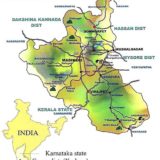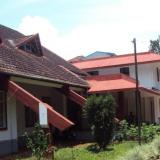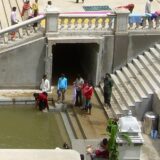SALIENT FEATURES OF THE FUL
Chief Justice S.B. Majmudar, and Judges M. Ramakrishna and R.V. Raveendran
Cheekere Kariyappa Poovaiah vs. State of Karnataka, 1993
Points for consideration:
1. Are the holders of Bane Lands in Coorg upon Jamma tenure, the owners thereof?
2. Whether Rule 167 (1) of the Coorg Land & Revenue Regulation, 1899, continues in operation despite the repeal of the Regulation by Karnataka Land Revenue Act, 1964?
Held (Judgment):
The scheme of the Coorg Regulation and the clear picture of different types of Jamma Bane which is projected bring out one salient fact, that in case of privileged or unprivileged Banes which were not alienated, the erstwhile Bane holders of such Bane lands continued to have limited privileges qua the Bane lands held by them, viz., that they had to use the attached Bane for servicing the holding of the wet land which was held by them on Jamma tenure and that he could use this Bane for grazing, supply of firewood and timber required for the domestic and agricultural purposes of the cultivator, so long as he continues in possession of the wet land, and could use this Bane for aforesaid limited purpose without any liability to pay any land revenue.
It is also pertinent to note that in such privileged or unprivileged Bane, the concerned holder had no interest or right in the sub-soil of the Bane as clearly laid down by Section 47 of the Regulations.
He had also no interest in the wood of the trees standing in the Bane, save and except taking wood for the limited domestic purposes and for purposes of agriculture.
He had no right to take the wood for trees for any commercial or other purposes unless he has paid the full timber value for cutting such trees, meaning thereby the trees were clearly shown to have been belonging to the government, the timber of which could not be utilized by the Bane holder, unless he pays full price for the timber of such trees. This amounted to sale of timber wood by the government to concerned Bane holder.
Such Banes held on privilege tenure also could not be alienated without paying nazrana as per Rule 167 to the government.
That also indicated that such Bane holders had no proprietary interest in the land and when they wanted to alienate such privileged Bane lands held by them, they had to pay nazarana to the government apart from obtaining permission from the concerned authority under Section 45 and if that was not done, he would be liable to be summarily evicted from such Bane, as that would be considered to be a Bane land, land revenue of which was considered to be wholly released.
Therefore, on a conjoint reading of Section 42, 45 and 47 (1) of the Regulation and Rule 167 of the Rules framed thereunder, it becomes clear that holder of Jamma Bane land which was not alienated and which was either a privileged Bane or unprivileged Bane, was not proprietor of this Bane. But he had limited privileges as indicated in the definition of Bane found in Regulation and therefore in the light of Section 42 such alienated, privileged or unprivileged Bane continued to vest in the government.
So far as owners of alienated Bane lands are concerned who converted these Banes either with permission or without permission of the Deputy Commissioner, they had cultivated the Bane lands and had put them under coffee cultivation or cultivation of any other crop and when full assessment was charged from them by the concerned Revenue Authorities at the relevant time for the conversion of their use, their holdings of such Bane became holding of alienated Bane by them and they became ordinary occupants of un-alienated land which was fully assessed to land revenue and they acquired rights subject to all obligations of a holder of an un-alienated land paying full assessment and all such privileges and benefits as occupants became available to them under Coorg Regulation, 1899.
So far as rights of such alienated Bane holders were concerned, they were not hit by Section 42 of the Coorg Regulation. This was subject to the rider that they had no ownership rights over the trees naturally growing on these Bane lands and subject to the further rider that they had no sub-soil rights in such Bane land.
They can be said to be enjoying limited proprietory rights of cultivating these lands on payment of full assessment and also cutting and removing the crops grown on these lands, whether it was coffee crop or any other crop. That much proprietory right or ownership right was available to such occupants of alienated Bane lands even during the time of the Coorg Regulation, 1899, held the field. The status quo ante regarding privileges of Jamme Bane land holder qua Jamma Bane land as such existed during the operation of 1899 Regulation continued to operate even after the 1964 Act, but it never got enlarged into full proprietory ownership of such holders qua their Jamma land.
On the contrary, the right to trees growing on the land which had continued to vest in the government earlier did not get divested nor did it vest in Jamma Bane holder under the 1964 Act and even sub-soil which did not vest in the Jamma Bane holder under 1899 Regulation also did not get vested in the Jamma Bane holder.
On the other hand, as per Section 70 of the Act, they all continue to remain vested absolutely in the state government.
If the Jamma Bane holder was the holder of any alienated Bane on the coming into force of Karnataka Land Revenue Act, 1964, he became an occupant of such fully assessed erstwhile Jamma Bane land and was entitled to all the rights and obligations of an occupant-holder of an un-alienated land paying full assessment to the government and therefore he became an occupant of such land within the meaning of Section 2 (20) of the Act and got all the rights of such occupant as laid down by Section 99 and 101 of the Act.
If the government wanted to abolish even the privileges and concessions which were otherwise giving some interest to the Jamma Bane holders, then they had to acquire such interests in these lands under the Land Acquisition Act, and obviously compensation was payable to such privileged Jamma Bane holders by evaluating their limited interest and not the full interest as proprietor.
Therefore, the mere fact that these privileged Bane lands were put to acquisition, it cannot be inferred of necessity that land holders of such Jamma Bane lands were treated by the government to be the full owners of such lands.
(ii) Rule 167 of the Rules framed under Coorg Regulation would not survive after the repeal of Coorg Regulation by Karnataka Land Revenue Act, 1964.
SEE APPENDIX FOR THE SALIENT FEATURES OF THE JUDGEMENT.
Jamma Judgement In A Nutshell:
That the holder of Jamma Bane land whether privileged or unprivileged will have limited privileges in Bane lands which are attached to Jamma wargs for servicing which, they are held. Those limited privileges will be:
- to hold the Jamma Bane lands free of revenue;
- to utilize the said land for grazing of cattle;
- to take leaf manure from the trees for the purpose of utilizing it for agricultural purposes on the warg lands;
- to take firewood and timber required for the agricultural and domestic purposes of Jamma Bane holders;
- They will have no ownership rights over sub-soil nor the trees growing on these lands, nor will be owners of the air-column above the surface of the soil;
- It is also declared that the alienated Jamma Bane lands which have ceased to be appendages to the warg, for servicing of which they were earlier held and which are put under cultivation and are fully assessed to land revenue, will be held by the holders of such alienated Jamma Bane lands as holders of occupancies of unalienated fully assessed lands and such occupants will be entitled to all the rights and will be subject to all the obligations of occupant-holders governed by the provisions of Karnataka Land Revenue Act, 1964, and the Rules made there-under.
Source: ‘Dateline Coorg’ by P.T. Bopanna. Published in 2010 by Rolling Stone Publications. E-book available with Amazon Kingle





















